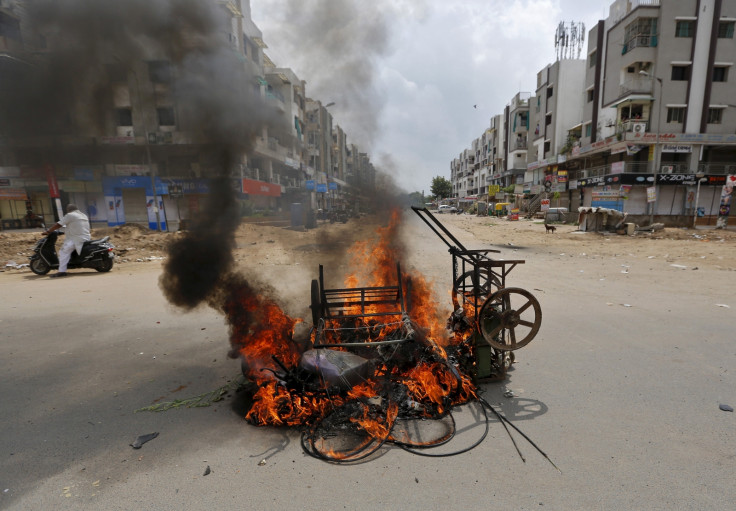India: Army deployed in Gujarat as nine die in Patel clashes

Thousands of armed forces have been deployed across Gujarat, north-west India to restore order after a protest turned violent, leaving nine people dead. The army could be seen patrolling the worst-affected areas on 27 August in the aftermath of heightened tensions.
The unrest was triggered by the detention of 22-year-old Hardik Patel on Tuesday (25 August) after he led a rally with an estimated 500,000 people in Ahmedabad, demanding Other Backward Classes (OBCs) – or affirmative action – for the Patidar community. Many members of the group use the surname Patel. Mobile internet services were blocked in the state in an attempt to quell what the police described as "rumour-mongering and crowd mobilisation through WhatsApp".
With diamond traders and merchants among the group's make-up, Patels are considered to be an affluent community which account for 20% of Gujarat's 63 million people. The group says it is struggling to secure civil service jobs and university places reserved for groups such as the Dalits – or untouchables – on the lower rung of the societal ladder who have faced centuries of discrimination. In a bid to counter this, half of India's state sector jobs and places in state educational institutions are reserved for OBCs.
"A student under reserved category with poorer grades gets admission, but a Patel does not get admission despite having secured higher grades," Patel said to the masses prior to his arrest. "We want reservation to preserve our dignity and our heritage. We have the right to reservation, and so do our children."
In a television interview on 26 August, Patel was no less emphatic in his message. "This is a fight for our rights," he said. "We will continue with our campaign on the roads and the streets."
Nine people, including a police officer and a father and son, were killed in the violence and about a dozen police officers were left wounded. About 40 police stations and 70 buses were torched.
Indian prime minister Narendra Modi, who hails from the state of Gujarat, has appealed for calm. "I appeal to all brothers and sisters of Gujarat that they should not resort to violence," he said in a statement.
"Violence has never done good for anyone. All issues can be resolved peacefully through talks," he continued. Modi served as Gujarat's chief minister for more than 10 years during which the deadly 2002 riots erupted, claiming 1,000 mainly Muslim lives. Modi was accused of not doing enough to stem the religious violence.
Gujarat's current chief minister Anandiben Patel has urged members of her community to maintain peace. Agence France-Presse is reporting calm in the state's economic hub, Ahmedabad, as shops and businesses reopen in certain areas.
Gujarat's High Court has ordered Ahmedabad's police chief to investigate police excesses during the unrest. Allegations include beating and opening fire on demonstrators as well as destroying public vehicles. The police chief has been given two weeks to complete the probe.
© Copyright IBTimes 2024. All rights reserved.






